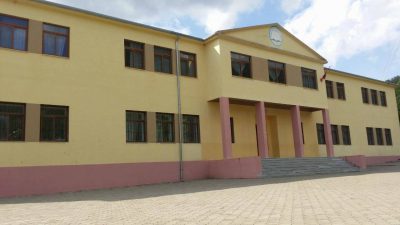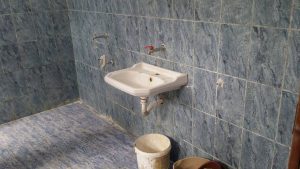This project is made possible through the partnership of WATER CHARITY and the NATIONAL PEACE CORPS ASSOCIATION. ![]()
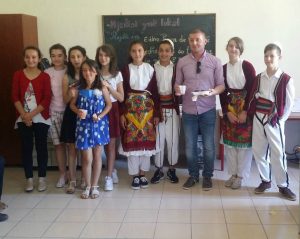 Location
Location
Rubik, Mirditë District, Lezhë County, Albania
Community Description
Rubik is a municipality located in the mountainous Mireditë District, in the central-north of Albania, along a national roadway that links Tirana/Lezhë County with Rrëshen/Kukes County and the new Albanian-Kosovo Highway. Surrounding Rubik are eleven villages: Fang, Katund I Vjeter, Bulshizë, Rasfik, Fierzë, Munaz, Rreja e Velës, Livadhëza, Vau Shkjezë, Rrethi I Eperm, Bulgër, and Rreja e Zezë. Roughly 3,500 people reside in Rubik, most of whom work as teachers, own small family businesses, farm, or travel to a nearby town to work as local government officials.
Only one road, about two kilometers long, runs through this small town. Both sides of the road are lined with cafés, small businesses, apartment buildings, and fruit/vegetable stands. At the south end of the road is Kishё e Shelbuemit (the Church of the Ascension, in English). Rubik is also made up of one health center, one soccer field, countless gardens, one high school, one kindergarten, and one 9-year school.
The 9-year school is where the project will take place. Without fail, visitors from other towns comment on the cleanliness and beauty of the building. Approximately 280 students attend school, one-third of which are from the neighboring villages, with a staff of about 20. Students and staff members, like the rest of the community, are closely integrated and bound in love or friendship. Proud locals boast about the town’s camaraderie, with good reason.
The students experience a positive, open learning environment; however, this project will address the issues associated with safety and health. Although the 9-year school is clean and presentable, it houses a deplorable bathroom due to lack of funding. Students, especially adolescent female students, are deterred from using the bathroom facilities and as a result, feel unsafe, feel embarrassed, and are more likely to skip school or become less hygienic.
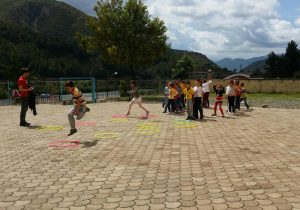 Problem Addressed
Problem Addressed
Shkolla 9-vjeçare Rubik is the only 9-year school in Rubik. The building is also required to be open after school hours, during the weekend, and during winter/spring/summer break to be used as Rubik’s community center. Shkolla 9-vjeçare Rubik is a two-floor building with one bathroom located in the south wing of each floor (2 bathrooms total).
The condition of the 2nd-floor bathroom is acceptable; however, the condition of the first-floor bathroom is deplorable. The first-floor bathroom includes two small rooms, for students, with four toilet stalls in each room and one small private room, for teachers, with one toilet. The issues associated with the bathroom are as follows.
– Safety and Privacy: None of the stalls have doors or curtains and neither of the student bathrooms has a sign to designate which stalls are to be used by boys and which stalls are to be used by girls. Female students usually do not use this bathroom for fear of a male student or teacher entering the room. Because of this, students and teachers are forced to use the bathrooms in pairs – one person uses the bathroom, while the other person stands as a “lookout” to ensure no one enters the stall being used.
– Hygiene: After using the toilet, none of the students or teachers are able to wash their hands. Of the five total sinks, only one is able to provide water. The one working sink leaks large amounts of water onto the tile floor and creates a slipping hazard for all who enter the room. The bathrooms are also missing soap dispensers, towels, and trash cans.
– Sanitation: Two of the nine toilets have a functional flusher cistern. The other toilets are used and sometimes flooded with urine or feces. Not only does this situation create an unpleasant smell throughout the south wing, anyone who uses the bathroom is at risk of becoming ill.
Other Safety Concerns: The glass windows of all three rooms are broken, none of the ceiling lights work in any of the three rooms, and exposed electrical wires hang at the entrance of the teacher’s bathroom.
– School Attendance: Because students, specifically girls entering the age of puberty, do not feel comfortable with using the bathrooms at school, these students often go home to use the bathroom. Although some students do return to school, far too many stay home. Consequently, students miss an average of about eight classes per week. By addressing these issues, we will create a clean and safe environment that the community of Rubik will be proud of.
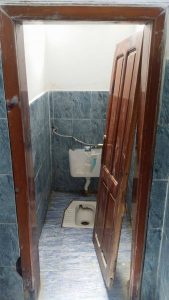 Project Description
Project Description
The goal of this project is to restore the main bathroom of Rubik’s 9-year school, promote healthy living, and join the Let Girls Learn mission.
The project will be completed with the help of the local government hall, students, parents, school staff members, and community members. Rubik is currently governed under the Rreshen Bashkia, who has agreed to supply the work labor needed for this project. The necessary materials will be acquired with the help of Water Charity. Together, we will accomplish the following objectives:
– Bathroom Renovation: Local professionals will repair five sinks, replace the light fixtures, restore the broken glass windows, remodel the toilet stalls’ concrete entrances, install doors for all eight toilet stalls, add toilet paper holders to each stall, replace two Turkish toilets, and repair seven flusher cisterns.
– Let Girls Learn/Health Education: Each class of students will participate in interactive health lessons lead by local health professionals and Peace Corps Volunteers. The lessons will initiate discussions about proper handwashing techniques, anti-flu practices, the importance of privacy, respect for public property, and respect for peers. Extra classes will be provided for girls who want to learn about menstruation.
– Community Development: Students will create posters with positive health messages for the community. Parents will help paint and clean whatever is necessary for the renovation.
Community members offered to donate hand-washing supplies. School staff will help deliver health lessons throughout the year to remind students about the importance of hygiene and respect. Involving the community in this project will build local trust and pride.
Project Impact
281 students and 20 school staff members will directly benefit from the project. Others in the community will benefit during the time the school is used as a community center.
Peace Corps Volunteer Directing Project
Jordan Arvayo
Monitoring and Maintenance
To ensure the sustainability of the project components, a continuous education lesson plan is incorporated. After the renovation, before being able to use the facilities, students and school staff will participate in a mandatory education session as described above. For those who are not able to attend the sessions, students will create summary posters to display around several areas in the community.
The school staff will collaborate and be responsible for the upkeep of the bathroom area. On school days, cleaning staff will empty the trash cans in the morning and mop the floors at the end of the school day. Teachers ad Teacher Aides will monitor the bathroom during the breaks, between classes. After school hours, on the weekends, and during holiday breaks, when the building is being used as a community center, the Community Center Administrator will inherit responsibility for the maintenance of the bathroom.
Let Girls Learn
Girls are reluctant to continue their schooling when toilets and washing facilities are not safe, not private, or not clean. Usually, uneducated girls fall into a cycle of poverty and inequality. By providing better sanitation services in school, we protect every girl’s right to receive an education and build a bright future for themselves.
The renovation of the bathroom, paired with the education component, will provide a multitude of benefits for the female students of Shkolla 9-vjeçare Rubik.
Girls will obtain a safer, more private, clean facility. The running water, trash cans, toilet paper holders, toilets, and sinks will allow every girl to practice good hygiene before, during, and after menstruation.
In addition to the lessons about hygiene and respect, an opportunity will be given to all female students to participate in discussions about the menstrual cycle. These discussions will describe why menstruation happens, how to maintain good hygiene, what to do if menstruation begins during a school day, fears about menstruation, and why it is important to attend school.
This Let Girls Learn project is inspired by Water Charity’s Let Girls Learn Initiative – Worldwide, which encourages girls to remain in school. This project is also part of the 100 Water Projects Program – Albania.
Fundraising Target
$2,000
Donations Collected to Date
$2,000
Dollar Amount Needed
$0 – This project has now been fully funded through the generosity of the Robert Victor Sager and Beatrice Mintz Sager Foundation.
Additional donations will be used for other projects in Albania.
This project has been completed. To read about the conclusion, CLICK HERE.
